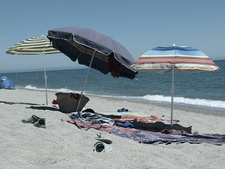-
Topics
subnavigation
Topics
Electromagnetic fields
- What are electromagnetic fields?
- Static and low-frequency fields
- Radiation protection relating to the expansion of the national grid
- High-frequency fields
- Radiation protection in mobile communication
Optical radiation
Ionising radiation
- What is ionising radiation?
- Radioactivity in the environment
- Applications in medicine
- Applications in daily life and in technology
- Effects
- What are the effects of radiation?
- Effects of selected radioactive materials
- Consequences of a radiation accident
- Cancer and leukaemia
- Genetic radiation effects
- Individual radiosensitivity
- Epidemiology of radiation-induced diseases
- Ionising radiation: positive effects?
- Risk estimation and assessment
- Radiation protection
- Nuclear accident management
- Service offers
-
The BfS
subnavigation
The BfS
- About us
- Science and research
- Laws and regulations
- BfS Topics in the Bundestag
- Links
Off you go on holidays – but without sunburn
Year of issue 2018
Date 2018.06.25
Date 2018.06.25
Whether on the beach, in the mountains or by the outdoor pool – the start to summer holidays in several federal states entices many people to spend a great deal of time outdoors. In order to not have spoiled the fun by sunburn, the Federal Office for Radiation Protection (BfS) recommends to be careful when exposed to the sun.
The UV radiation emitted by the sun supports the formation of vitamin D in the body but may also become a risk: Apart from sunburn, eye or corneal inflammation, an increasing skin cancer risk and premature ageing of the skin as well as cataract formation threaten to develop. "Those enjoying the sun on holidays should avoid sunburn,"
Inge Paulini, President of the BfS, says. "In view of the increasing number of skin cancer diseases, we urgently recommend sufficient sun protection."
In the fair-skinned population, the growth rate of skin cancer diseases remains world-wide higher than that of all other cancers. In Germany, every seventh male and every ninth female until age 75 develop skin cancer (light skin cancer types and black skin cancer) – with the trend on the rise: In Germany alone, the rate of new cases doubles about every 10 to 15 years. The growth rate of "black skin cancer" (malignant melanoma) rises more strongly than that of all other cancer types. An increasing number of young persons develop it, especially women. Over 2,500 persons per year die from black skin cancer in Germany alone. Here, the work of the BfS starts: counteracting UV-caused diseases and especially skin cancer.
Get the current BfS UV prognosis by newsletter
The safest protection against sunburn is: Avoiding strong sunlight! When the sun shines over long periods of time, shady places offer recovery for skin and eyes. In intense sunshine one should look for shelter indoors – especially around noon when the sun's effect is highest. Outdoor activities should be planned accordingly. Guidance is provided by the UV index which has been harmonised world-wide. The UV prognosis sent by the BfS every Monday, Wednesday and Friday informs about the expected UV values.
UV protection, i.e. protective clothing, sunglasses and sunscreen, should be basic part of the luggage. The best protection is provided by clothing – also when swimming. Head and neck should be protected by a wide brimmed sun hat, the eyes with sunglasses marked "UV 400" by the manufacturer and sitting tight on the face.
For a certain length of time sunscreen protects, too – in case it has been applied lavishly and distributed evenly. All this needs repeating on a regular basis. It is recommended to use sunscreen with high to very high sun protection factor which is photostable and filters UV-B and UV-A. During a beach holiday, a beach wind breaker or parasol prove useful.
Those travelling by car on holidays should remember sun protection already en route. Protection against UV-B radiation is good inside the car and one doesn't get sunburn, but the side windows let UV-A radiation through. On sunny days, UV protection is therefore also necessary inside a car during longer car trips. This applies more or less to journeys by plane.
State of 2018.06.25




